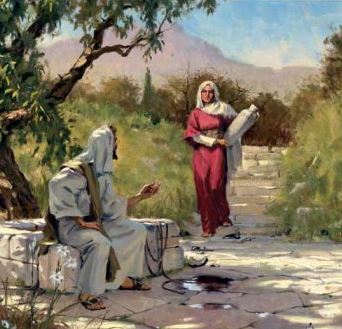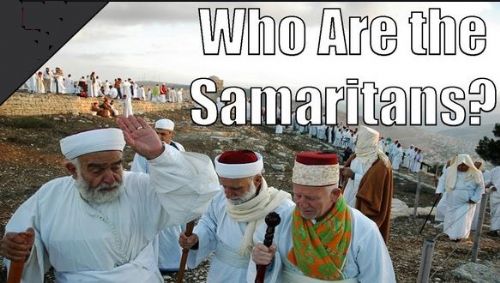Most everyone has heard the term “Good Samaritan,” but who exactly were these people?
Samaritans claim they are Israelite descendants of the Northern Israelite tribes of Ephraim and Manasseh, who survived the destruction of the Kingdom of Israel (Samaria).
For that information, we need to go back in history to about 722 B.C.E. Because of the idolatry and sinful behavior of the Northern ten tribes of Israel, God brought the Assyrian military against them. “The king of Assyria invaded the entire land, marched against Samaria and laid siege to it for three years.” (2 Kings 17:5)
Eventually they dominated against the Northern ten tribes and those Israelites who were conquered were taken as captives to Assyria. However, the Assyrians left the poorest, lowest and sickest of the land still there, so as not to bring back any “lowest of the low” to their capital. Afterwards, the Assyrians then brought “in” foreigners to work the land and pay them tribute (taxes).
These foreigners intermingled with the remnant of Israelites left there. They intermarried and eventually became what we call the “Samaritians”. The name comes from the region called “Samaria” which contained Mount Gerizim. If you remember, that Mountain was where Moses said (after they arrived in the land under Joshua) half of the Israelites should stand and recite the blessings of following the Torah. He said the other half should stand on Mount Ebal and they pronounced the curses of not following the Torah. (Deut 11.29) This mountain today is about 25 miles north of Jerusalem.
Mount Gerizim, Mount Ebal today
The Samaritians considered Mount Gerizim as the place where God wanted them to worship. “Our ancestors worshipped on this mountain, but you say that the place where people must worship is in Jerusalem.” so said the Samaritan Woman to Jesus in John 4.20.
Eventually the Samaritiams practiced a mixed for of worship. Take a look at how the Bible writer summarizes the situation:
The king of Assyria invaded the entire land, marched against Samaria and laid siege to it for three years. 6 In the ninth year of Hoshea, the king of Assyria captured Samaria and deported the Israelites to Assyria.
24 The king of Assyria brought people from Babylon, Kuthah, Avva, Hamath and Sepharvaim and settled them in the towns of Samaria to replace the Israelites. They took over Samaria and lived in its towns.
They worshiped the Lord, but they also appointed all sorts of their own people to officiate for them as priests in the shrines at the high places. 33 They worshiped the Lord, but they also served their own gods in accordance with the customs of the nations from which they had been brought.
Even while these people were worshiping the Lord, they were serving their idols. To this day their children and grandchildren continue to do as their ancestors did. (2 Kings 17: 5,6,24, 32,33, 41)
Samaritan Service on Mt Ebal.
So you can see why, during Jesus’ day, the Samaritans were so disliked. Those in Jerusalem / Judea looked at them as half God / half pagan worshippers. They avoided contact with these people if at all possible. “For Jews do not associate with Samaritans.” (John 4.9) But not Yeshua / Jesus. While He certainly was not approving of their false worship, He made it a point to interact with someone from the community (the woman at the well) to help plant a seed of truth. And it worked.
Then, leaving her water jar, the woman went back to the town and said to the people, “Come, see a man who told me everything I ever did. Could this be the Messiah?” They came out of the town and made their way toward him. (John 4:28-30)

Believe it or not – these people still exist today!
Since the 1970s their population has held at about 800; they mostly live near the Israeli city of Holon and Nablus in the West Bank. All live in semi-isolation, marrying only within their own community. They pray in Hebrew but many adopted Arabic as their vernacular after the Muslim conquest of 636 CE. They are not Palestinian nor fully considered Jewish.
Those who reside in Holon, near Tel Aviv, are fully integrated members of Israeli society who speak modern Hebrew and serve in the Israel Defense Forces. Samaritans living in the Palestinian controlled territory of the West Bank are also integrated members of that society, although they have reported instances of discrimination for being ‘Jewish’.
However, their religion is closely intertwined with Judaism, connecting them to millions of Jewish Israelis. The Samaritans today worship in a synagogue, speak ancient Hebrew, observe the Sabbath, celebrate Jewish holidays such as Passover and Sukkot (although the dates differ) and their holy text is called the Samaritan Torah.
They try to stay neutral in regards to politics. ‘We don’t go with Palestine, and we don’t go with Israel,’ said Hosni Cohen, a Samaritan priest, in a 2016 interview. ‘We must go straight down the middle.’
Perhaps some of these are direct descendants of the woman at the well with whom Jesus spoke.
Fascinating.






